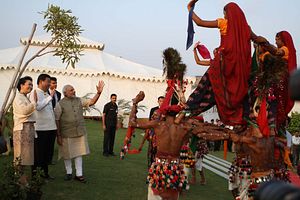While New Delhi and Beijing seek to resolve complex strategic and economic issues, it is interesting to see a realization and acceptance on both sides about the importance of “soft power” and greater people-to-people contact in reducing differences between both sides.
Indian Ambassador to China Gautam Bambawale spoke recently about the need for greater engagement between India and China, not just on contentious issues — such as the China-Pakistan Economic Corridor (CPEC) and the massive trade deficit for India — but also at the people-to-people level. In an interview with the Global Times on January 25, 2018, the Indian ambassador said:
I believe that in the post-Doklam period, India and China need to be talking to each other and conversing with each other much more than in the past. This should be done at many different levels, including at the leadership level, the official level and the people-to-people level.
Chinese Foreign Ministry spokesperson Hua Chunying, in response to Bambawale’s interview, stated that China was willing to address India’s concerns on CPEC, and that the project was not targeted at any one country.
Apart from more official meetings, Bambawale also spoke about the importance of more exchanges between parliamentarians, businesspeople, and journalists as well as greater two-way tourism. There has been an increase in Indian tourists visiting China. In 2015, more than 700,000 Indian tourists visited China; that figure surpassed 600,000 in just the first nine months of 2016.
Interestingly, Bambawale also spoke about the importance of Bollywood movies in the context of making Chinese more aware about India. According to the ambassador, “China must import more Bollywood films so as to understand India better.”
The new film Secret Superstar, which stars Bollywood actor Aamir Khan, has dominated the Chinese film market in spite of competition from Hollywood releases like Jumanji: Welcome To The Jungle and Maze Runner: The Death Cure, as well as homegrown films like Forever Young. Earlier Aamir Khan movies have also done well in China, with another of his films, Dangal, grossing a whopping $220 million. Interestingly, when Indian Prime Minister Narendra Modi and Chinese President Xi Jinping met on the sidelines of the Shanghai Cooperation Organization (SCO) summit in Astana, Kazakhstan in June 2017, the Chinese president said that he had watched Dangal and had liked it.
India and China are competing in every sphere, including soft power, with China having invested heavily in Confucius Institutes, and having been successful in attracting foreign students as well as tourists. Significantly, China was ranked 25th in the Top 30 Soft Power Index, 2017 by Portland. India does not figure in the top 30 countries as far as soft power is concerned.
While India and China may be competing even in the arena of soft power, it clearly has the potential to play a constructive role in the complex bilateral relationship. Components of soft power have played an important role even in periods of China-India tensions.
Even when there are strains at the political level, Bollywood movies have been getting a good response in China – as is evident from the success of Dangal and more recently, Secret Superstar. It is not just Bollywood, however; there are numerous areas where exchanges are increasing. For instance, the India-China Yoga College at Yunnan Minzu University has begun master’s level courses in Yoga, and is also likely to start bachelor’s courses. Apart from this, the number of Indian students studying in China has increased. In 2016, there were over 18,000 Indian students in China, marking the first time the number of Indian students in China (18,171) surpassed those studying in the United Kingdom (18,015) – albeit by a small number.
Innovative approaches are needed to make these soft power exchanges more effective. Exchanges between students should be increased; currently such exchanges are restricted to a few big universities in the bigger cities. More Chinese students should also be encouraged to study in India.
Steps can be taken to increase people-to-people exchanges between cities and provinces that have signed sister city or sister province agreements. Efforts should be made to enhance cultural and people-to-people linkages between eastern Indian states (where Chinese companies are now beginning to explore investment opportunities) and different provinces in China. A special emphasis should be laid on encouraging tourism.
All these efforts will ensure that citizens of both countries get fresh perspectives and views, and are not influenced by what is reported in the media.
There is absolutely no doubt, that both India and China have serious differences on very important issues. Soft power by itself cannot resolve these, but it can pave the way for greater understanding and have a positive influence on the mindset on the youths of both countries.
Tridivesh Singh Maini is a New Delhi-based policy analyst associated with the Jindal School of International Affairs, OP Jindal Global University, Sonipat.

































